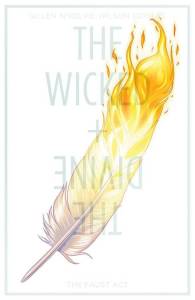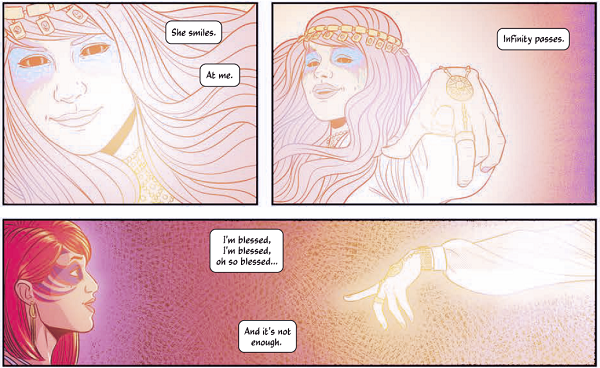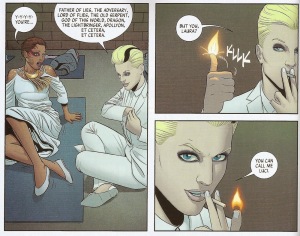-J. Michael Bestul is a writer for the Addison Recorder. Stephanie Ruehl works in a comic book shop. They’re married and have a lot of discussions about comic books and graphic novels. Combine all that into a biweekly feature and you get “J. & Steph Talk About Comics.”
 This time around, J. & Steph discuss the newest addition to the “young adult meets the supernatural” genre. Is that a genre yet? If not, it probably should be at this point. The Wicked & The Divine is an amorous take on the concept, a story of mysteries piled upon mysteries wrapped up in a gorgeous package.
This time around, J. & Steph discuss the newest addition to the “young adult meets the supernatural” genre. Is that a genre yet? If not, it probably should be at this point. The Wicked & The Divine is an amorous take on the concept, a story of mysteries piled upon mysteries wrapped up in a gorgeous package.
The Wicked & The Divine (vol. 1)
Words by Kieron Gillen, art by Jaime McKelvie, color by Matthew Wilson, letters by Clayton Cowles
Synopsis: Every ninety years, twelve gods return to Earth as young people. They are loved, they are hated, and in two years, they are all dead. It’s happening now. It’s happening again.
Steph: This book is very beautiful. Visually, it’s one of the best-illustrated comics I’ve read in a long time. One of the reasons I love comics is because I am drawn to visual art. I can enjoy a not-so-well-written book if the art is done well. But this book? The story, the characters, the art — I devoured it. I got so excited I ended up skimming almost half the book just find out what happens, only to find myself staring at the art. After which I had to go back and force myself to re-read it, slowly, so I could pick up everything I missed the first time. When I did get to the final page I actually shouted “Ahh! No! There needs to be more!” out loud.
-J: I may not have said it aloud, but I was definitely thinking it. If the rest of the series is this good, I could easily binge-read all the books.
Steph: So the idea of this story is that every ninety years, twelve gods possess the bodies of young people and live for two years before they die, though ‘possess’ seems like too strong of a word.
-J: “Inhabit,” maybe?
Steph: “Inhabit” works. They all seem to remember who they were before becoming gods, but there’s no struggle to remain that way. Amaterasu, a former seventeen-year-old girl named Hazel, is confronted in an interview in which she says she no longer feels like Hazel. She is now the Shinto goddess of the sun, simple as that. The crux of the story is whether or not these people are in fact gods.
-J: It’s an interesting juxtaposition, because the story completely acts like these twelve are the gods they claim to be. But the people within the story view them more and less skeptically. There are the adoring masses, who don’t seem to have any critical approach to The Pantheon (as the gods are called). There are non-fans who don’t care, and there are a few who are highly skeptical.
Steph: The public at large seems to be non-believers, and their fans don’t seem to care about belief. The exception is Laura, a seventeen-year-old girl who is obsessed with The Pantheon. She makes it a point to see each one, and it’s at a show put on by Amaterasu where she meets Lucifer (“Luci” to her friends). Luci is the character I fell for. Slightly cold and very sarcastic, she has no fear — and no problem speaking her mind. I would expect nothing less from the Devil, but she’s also charming, funny, and very protective of her fellow gods, especially Amaterasu.
-J.: I’m pre-disposed to liking Luci, but the character who really struck me was Cassandra. She’s the perfect foil to the obsessed, the adoring, and the apathetic. She’s the skeptical, fact-driven writer who’s confronted with the supernatural, which is a trope I’m fond of. She has a “Masters in Comparative Mythology and did [her] thesis on the stories around the recurrence,” which means she’s damn near fated to be a part of this story. Plus, her name is “Cassandra” — a name Greek mythology associated with a prophet whose curse was that nobody would believe her.
Steph: The problems start when Cassandra is interviewing Amaterasu, and being a bit of a jerk about her skepticism, when bullets come flying through the window. Lucifer, who was already angry about Cassandra’s interview and total lack of respect, deals with the shooters (who were Christian zealots trying to take out the false gods). Lucifer snaps her fingers, and BAM — no more heads on the two shooters. Lucifer is taken into custody and at her court hearing, even though there is no physical way she could have, she is held responsible for the deaths of the shooters. Which brings into question whether or not the court is officially calling her a god.
-J.: As this rhetorical debate reaches absurdity, the judge is killed in a very similar manner. Naturally, Luci is suspected, and is led away in chains (and “frustratingly un-erotic fingercuffs”). At this point, The Wicked & The Divine turns into a supernatural murder mystery, and suddenly I want to find ALL THE CLUES. We follow Laura and Cassandra as they try to navigate the real world and The Pantheon, but are operating semi-blind.
Steph: There’s something I find compelling about Laura. She is so very human amongst these gods. She is willing to fail school, alienate her parents, and be forever friendless in order to help Lucifer — someone she has fallen head over heels for in just a few days. Laura is Tumblr incarnate and she is the only one who truly believes that Luci is innocent. She just has to take on humans and gods alike to try to prove it.
-J: And that mundane mystery is on top of the mystery of The Pantheon. For me, the layered mysteries create a very delicious story. The creators tell a very self-aware tale, which includes gems like Luci figuring a certain character might have framed her because of “genre tropes.” Few other books have had Steph and I debating the finer points of mystery and mythology (Who are the two missing gods? Why didn’t Susanoo-no-Mikoto return for this recurrence? How many Ba’als were there in the ancient Mediterranean?). And then, just when the story seems to hit its denouement, we get a big ol’ surprise. Well, maybe it shouldn’t have been a surprise since the name of this volume is “The Faust Act,” but that doesn’t mean I was ready for the cliffhanger. Gods, I cannot wait for the next volume.
To Sum It All Up…
Volume one of The Wicked & The Divine is a beautiful tale of gods, youth culture, mythology, and murder. It left both of us desperately craving the next volume, which is never a bad way to start a series.



